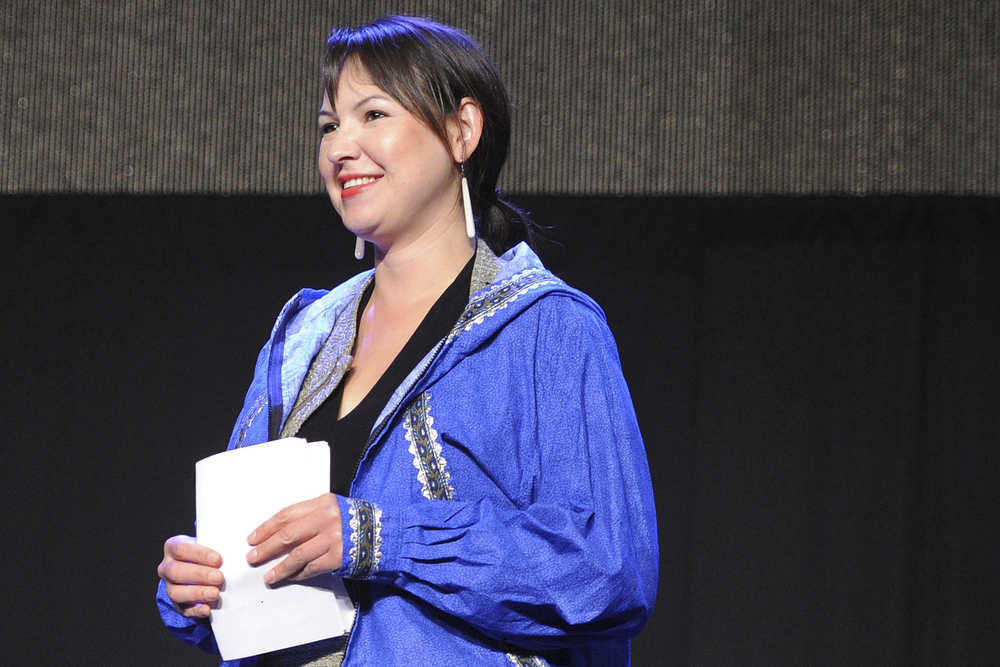ANCHORAGE — The state’s senior senator has called her Alaska’s “secret agent” in the White House.
Indeed, Raina Thiele, an Alaska Native with roots in Bristol Bay and the Cook Inlet region, worked with President Barack Obama to organize his historic trip to Alaska and increase Alaskans’ access to the administration.
But Thiele, 32, is quick to say she’s not the reason for the president’s interest in the state.
Instead, it stems from Obama’s efforts to reach out to American Indians and Alaska Natives nationwide, his attention to climate change and its big impact in Alaska, and the nation’s current role as chair of the eight-nation Arctic Council.
“I think that’s really helped to highlight Alaska voices in a very big way,” she said.
Others are quick to praise Thiele. They say she put together the president’s private round table with tribal leaders, Obama’s first meeting during his three-day stop in Alaska. She also helped arrange his tightly choreographed visits to the predominantly Alaska Native towns of Dillingham in Bristol Bay, and Kotzebue, above the Arctic Circle.
Officially, Thiele is the White House’s associate director of Intergovernmental Affairs and Public Engagement. But Sen. Lisa Murkowksi, R-Alaska, speaking to thousands at the annual Alaska Federation of Natives last month, called her the state’s “secret agent.”
“She is President Obama’s top Native liaison, and she is one of ours – enrolled to Pedro Bay,” said Murkowski, referring to the Bristol Bay region village where Thiele spent summers smoking fish with family.
Reggie Joule, the former Northwest Arctic Borough mayor, said Thiele was his conduit to the Obama administration when he wanted to discuss regional issues.
“I think by her nature she’d help anyone, but especially Alaskans and Alaska Natives,” said Joule, who worked with Thiele to bring the president to Kotzebue.
On one trip to the White House, Thiele escorted Joule through the West Wing, introducing her colleagues. It was “cool” watching an Alaskan move through the White House with confidence, Joule said.
So how did Thiele, whom many Alaskans have never heard of, get where she is?
Ask her mom, a teacher’s aide at Goose Bay Elementary School in Wasilla, and she’ll say it was partly her family’s emphasis on education – and Thiele’s drive to overachieve.
Raina was in second grade when she announced she would attend Yale or Harvard.
“I was like what? I don’t think I’d even heard of those colleges,” said Sarah Thiele, whose own mother, the late Mary Jensen of the Bristol Bay region, never attended school at all.
As it turned out, Raina, who graduated from Houston High School in Wasilla in 2001, attended both.
It’s an especially important achievement considering the low high school graduation rates for Alaska Natives. A 2014 White House report, noting the social and economic challenges faced by Native youth, reported Alaska Natives and American Indians had a 67 percent graduation rate in 2012, the lowest in the nation among ethnic and racial groups. The numbers are even lower for Alaska Natives when looked at separately in 2014: 55 percent, according to the Alaska Department of Education and Early Development.
Thiele said adjusting to college on the East Coast was tough, but she graduated from Yale and later attended graduate school at the John F. Kennedy School of Government at Harvard, where an internship led to a job at the Office of Management and Budget in the president’s Executive Office.
There, Thiele worked with others helping compile the president’s budget request to Congress, and she got to know the White House’s tribal affairs team. That provided a springboard to her current position, and her role in the president’s effort to improve opportunities for Alaska Natives and American Indians.
In summer 2014, for example, Thiele helped organize a presidential trip to the Standing Rock Sioux Nation in North Dakota, where the president and first lady Michelle Obama were moved by the challenges facing Native youth. It was Obama’s first presidential visit to Indian Country.
After the trip, the president called Thiele and others into a meeting where he laid out a vision for a new Native youth effort.
With that, Thiele helped organize the Generation Indigenous initiative, or Gen-I. The program connects Native youth across the country and challenges them to launch community projects that might be eligible for federal funding.
The initiative led to the First White House Tribal Youth Gathering this summer, attended by some 1,000 young leaders, including many from Alaska.
“It was very moving to see all these youth from all over Alaska and all over the country have their voices elevated,” said Thiele.
Thiele, who comes from Yup’ik, Athabascan and European stock, credited her parents for fostering a “reach-for-the-stars” mindset. She called it critical to the first big step in her journey to the White House: attending college outside Alaska.
Beyond emphasizing education, the Thieles made sure Raina knew her culture.
The commercial fishing family had their own small planes and flew each summer to Pedro Bay, population 47 today, where Thiele and her siblings helped relatives put away salmon for the winter.
Though the Thieles moved to Big Lake when Raina was young, the family often returned to Alexander Creek, a small community cut off from the road system by the Susitna River, where Raina spent some of the first years of her life, attending home school taught by residents from up the creek in kindergarten and first grade.
“I made it a point to expose them to Native culture and I think that’s where she gets her connection to help Native people,” said Sarah.
As a kid, Thiele said, she wanted to be the nation’s first woman president. Though she’s tamped down that expectation, it’s something her mom isn’t ruling out.
As for Thiele, she’s focused on continuing to promote opportunities for young Natives, and advancing the president’s goal of ensuring “Native youth across the country have the resources they need to succeed and prosper,” she said in an email.

